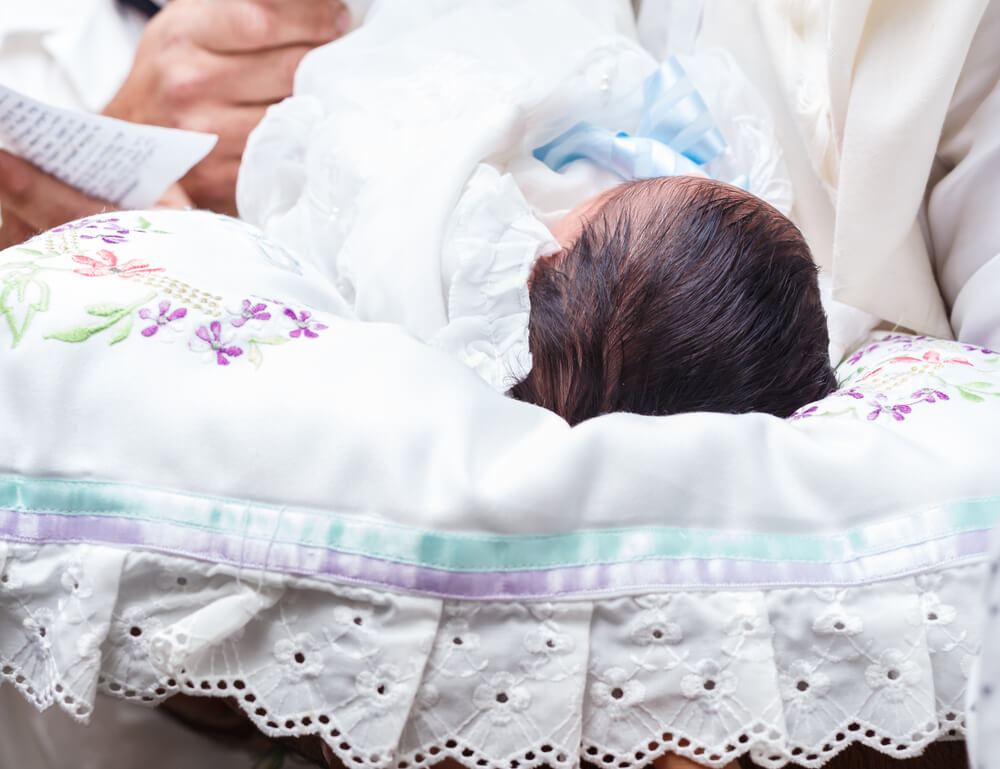Jewish parents, especially first-time parents with baby boys, often feel uneasy about the brit milah, or the Jewish circumcision ceremony, in which their baby boy joins the holy covenant. Most of them fear that the lack of anesthesia may cause immense pain and may even cause trauma to the newborn baby.
These concerns are legitimate, as parents have every right to feel a bit worried about their child’s health, even if the brit milah serves a higher religious purpose. In this article, Dr. Andrew Krinsky Mohel aims to answer the question “How painful is circumcision for a newborn?” and try to bring anxious parents peace of mind.
So, to find out whether is Jewish circumcision, feel free to read on.
Is a Bris Painful? Do Babies Feel Pain During Circumcision?
It’s not difficult to relate to the parents’ worries, and most mohels and rabbis would even be quite disconcerted if parents would not worry even a bit about the well-being and health of their newborn baby.
Still, it’s important to take comfort in the fact that the act of the brit milah, or circumcision, has been performed in Jewish communities in the same manner for over 3700 years. Also, the expert Jewish circumcisers, the mohels, have the necessary training and experience to perform the procedure in a way that will minimize all aspects of discomfort and pain for the newborn child.

How Painful is Circumcision for a Newborn?
During the circumcision procedure, the mohel employs a swift motion with an izmel, a traditional scalpel designed for brit milah, with the intention of minimizing any pain or discomfort. Observers near the mohel may notice that the infant often begins crying when the diaper is opened and ceases crying when it’s closed.
It’s worth remembering that at this very young age, many infants cry even when undergoing routine diaper changes or baths, and the cry is not necessarily linked to pain in these instances. Typically, the infant remains calm as blessings are recited over a cup of wine and their Jewish name is announced.
Interestingly, the traditional circumcision takes place on the eighth day of the child’s life, precisely when their clotting factor has fully developed, facilitating optimal healing. Simultaneously, the nerve endings are not yet fully developed, reducing the infant’s discomfort.
Traditional brit milah does not involve anesthesia, as it could potentially introduce additional complications and have adverse effects on such young children. In summary, the brit milah is conducted at the healthiest time, employing the most suitable method, and it’s noteworthy that complications arising from a traditional circumcision are exceedingly rare.
It’s important to highlight that brit milah, as a sacred tradition, is conducted with meticulous care and reverence for the child’s well-being. The mohel, often a trained professional with expertise in performing circumcisions, adheres to rigorous hygiene standards to ensure a safe and sterile environment.
Moreover, the procedure is surrounded by a sense of community and spiritual significance, with family and friends often present to celebrate this important milestone in the child’s life. This collective support and shared cultural experience contribute to the overall sense of unity and tradition within the Jewish community.
Ultimately, the brit milah ceremony reflects the commitment to preserving tradition, celebrating life, and welcoming a new member into the Jewish faith with reverence and respect for both the child and the age-old customs.
What To Avoid: Circumcision The Painful Way
Circumcision procedures conducted in hospitals or through non-traditional methods frequently employ the use of a clamp. This approach can be exceedingly painful and traumatic for the child, as the clamp exerts pressure on the skin tissue before severing it. It’s important to note that this painful method is not in accordance with Jewish law and does not fulfill the Biblical requirement of circumcision.
Additionally, the FDA has raised concerns regarding the use of clamps in circumcision, warning about potential risks, including lacerations, hemorrhaging, penile amputation, or damage to the urethra. These safety concerns underscore the importance of considering alternative and less traumatic methods for circumcision procedures.
Caring For Your Child After The Circumcision
After the circumcision, it is crucial to provide appropriate care for your baby’s penis until it completes the healing process. This care routine entails cleansing the area with plain water at least once daily and addressing any soiling after a bowel movement. Following this, allow the area to air dry, and apply petroleum jelly to prevent the gauze dressing from sticking.
Your healthcare provider may provide instructions to either remove the dressing on the following day or replace it during diaper changes, applying a fresh coat of petroleum jelly. Even after the gauze dressing is no longer needed, you may be advised to continue applying petroleum jelly to the penis tip for a few extra days to prevent it from adhering to the diaper.
It’s noteworthy that some degree of swelling and the development of a crust on the penis are typical occurrences during the healing phase, and these issues typically resolve within a few days. In rare cases where you notice a blood stain on your baby’s diaper larger than a quarter, it is imperative to reach out to your healthcare provider promptly. If persistent bleeding occurs, gently apply pressure with a washcloth for several minutes and check if the bleeding has ceased. If it persists, seek immediate medical attention by taking your child to the emergency room.
Additionally, while caring for your baby’s healing circumcision site, it’s essential to ensure that the diaper fits comfortably and isn’t too tight, as this can contribute to irritation. Be vigilant for any signs of infection, such as increased redness, warmth, swelling, or discharge from the area, and promptly notify your healthcare provider if you suspect any issues.
Furthermore, it’s advisable to avoid using scented wipes, lotions, or powders on the treated area, as these products may cause irritation. Instead, opt for gentle, unscented baby wipes during diaper changes to minimize the risk of discomfort or complications.
Remember that each baby’s healing process may vary slightly, so closely following your healthcare provider’s post-circumcision care instructions is essential to ensure a smooth and comfortable recovery for your little one.

Joining The Eternal Covenant
Is Jewish circumcision painful? While newborn babies may feel discomfort, the pain won’t linger for long.
Instead of focusing on the pain, parents should think about the importance of the ceremony, which has been observed by faithful communities for thousands of years, ever since Abraham’s own circumcision at the age of 99.
Often, when the procedure is over, and when parents are holding their beloved son, they come to see that the discomfort and pain are only short-lived, yet its results are forever, and their child will be in an eternal covenant with God.
That said, if you want to learn more about the procedure or about the traditions pertaining to the brit milah, feel free to reach out to us and Dr. Krinsky.






